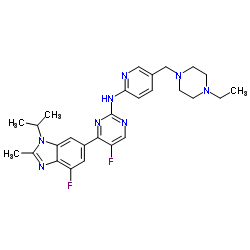Lilly and Merck Expand Immuno-Oncology Collaboration Adding Abemaciclib and KEYTRUDA® Combination Trial
abemaciclib (LY2835219)
INDIANAPOLIS and KENILWORTH, N.J., Dec. 10, 2015 /PRNewswire/ -- Eli Lilly and Company (NYSE: LLY) and Merck (NYSE: MRK), known as MSD outside the United States and Canada, today announced another immuno-oncology collaboration that will evaluate abemaciclib (LY2835219), Lilly's cyclin-dependent kinase (CDK) 4 and 6 inhibitor, and Merck's KEYTRUDA® (pembrolizumab) in a Phase I study across multiple tumor types. Based on the Phase I trial results, the collaboration has the potential to progress to Phase II trials in patients who have been diagnosed with either metastatic breast cancer or non-small cell lung cancer (NSCLC).
Lilly is the sponsor of the Phase I study, and of any subsequent Phase II studies, per the terms of the agreement. Enrollment is scheduled to begin in early 2016. Financial details of the collaboration were not disclosed.
Lilly's abemaciclib is a cell cycle inhibitor, designed to block the growth of cancer cells by specifically inhibiting CDK4 and CDK6. Pembrolizumab is a humanized monoclonal antibody that works by increasing the ability of the body's immune system to help detect and fight tumor cells. Pembrolizumab blocks the interaction between PD-1 and its ligands, PD-L1 and PD-L2, thereby activating T lymphocytes, which may affect both tumor cells and healthy cells.
"With our active Phase III program underway for abemaciclib in both metastatic breast cancer and non-small cell lung cancer, we are committed to uncovering every opportunity to help these patients – and this includes exploring abemaciclib in combination with immunotherapy," said Richard Gaynor, M.D., senior vice president, product development and medical affairs for Lilly Oncology. "We're encouraged by our productive immuno-oncology collaborations with Merck, through its affiliates, and coming together for another clinical trial is a natural evolution of our scientific collaboration."
"We look forward to continuing our collaboration with Lilly on this combination study with KEYTRUDA and abemaciclib," said Eric Rubin, M.D., vice president and therapeutic area head, oncology early-stage development, Merck Research Laboratories. "Strategic collaborations such as this one reinforce the commitment we have to bringing new combination treatments to the forefront for people with cancer."
NOTES TO EDITORS
About Abemaciclib
Cyclin-dependent kinases play a key role in regulating cell cycle progression. In many cancers, uncontrolled cell growth arises from a loss of control in regulating the cell cycle due to increased signaling from CDK4 and CDK6. Lilly's abemaciclib (LY2835219) is a cell cycle inhibitor, designed to block the growth of cancer cells by specifically inhibiting CDK4 and CDK6, and in cell-free enzymatic assays has been shown to be most active against Cyclin D1/CDK4. Results from preclinical and early-stage clinical studies support the further evaluation of abemaciclib for the treatment of human cancers – including breast cancer and lung cancer – in which aberrant CDK4 and CDK6 pathways enhance cancer cell growth.
Abemaciclib is in Phase III development with two trials in HR+ breast cancer patients, as well as a Phase III trial in lung cancer.
About Lilly Oncology
For more than fifty years, Lilly has been dedicated to delivering life-changing medicines and support to people living with cancer and those who care for them. Lilly is determined to build on this heritage and continue making life better for all those affected by cancer around the world. To learn more about Lilly's commitment to people with cancer, please visit www.LillyOncology.com.
About Eli Lilly and Company
Lilly is a global healthcare leader that unites caring with discovery to make life better for people around the world. We were founded more than a century ago by a man committed to creating high-quality medicines that meet real needs, and today we remain true to that mission in all our work. Across the globe, Lilly employees work to discover and bring life-changing medicines to those who need them, improve the understanding and management of disease, and give back to communities through philanthropy and volunteerism. To learn more about Lilly, please visit us at www.lilly.com and newsroom.lilly.com/social-channels.
About KEYTRUDA (pembrolizumab) Injection 100 mg
KEYTRUDA is a humanized monoclonal antibody that works by increasing the ability of the body's immune system to help detect and fight tumor cells. KEYTRUDA blocks the interaction between PD-1 and its ligands, PD-L1 and PD-L2, thereby activating T lymphocytes which may affect both tumor cells and healthy cells.
KEYTRUDA is indicated in the United States at a dose of 2 mg/kg administered as an intravenous infusion over 30 minutes every three weeks for the treatment of patients with metastatic non-small cell lung cancer (NSCLC) whose tumors express PD-L1 as determined by an FDA-approved test with disease progression on or after platinum-containing chemotherapy. Patients with EGFR or ALK genomic tumor aberrations should have disease progression on FDA-approved therapy for these aberrations prior to receiving KEYTRUDA. KEYTRUDA is also indicated at the same dosing for the treatment of patients with unresectable or metastatic melanoma and disease progression following ipilimumab and, if BRAF V600 mutation positive, a BRAF inhibitor. These indications are approved under accelerated approval based on tumor response rate and durability of response. An improvement in survival or disease-related symptoms has not yet been established. Continued approval for these indications may be contingent upon verification and description of clinical benefit in the confirmatory trials.
Source: http://www.prnewswire.com/




